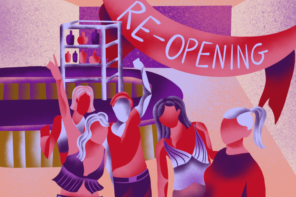Late last year, Sean Saggi of The Bull & Bear sat down with David Abramson, leading stratigest at BCA Research. The following is the full transcript of the interview.
Sean Saggi: Can you tell me a little bit about your position? What sort of work do you do as part of BCA?
David Abramson: In a nutshell, I’m a strategist. Not just an economist, not just an investment manager, but a combination of the two. You need to see the big picture but be granular. I’m a commodities strategist, but the end point is to have a commodities strategy for the investor. We’re not ever going to be zinc or natural gas experts; what we need to do is start with top-down themes like “China is going to have a soft-landing. What are the commodities [that] would be affected? Maybe some of them will be cheap.” That’s what I do at BCA. The skillset usually is an economics background and some background in investing. What are you giving these people that they can’t read in the newspaper? You are writing something every week and asking them to pay a lot of money – why won’t they read it in the New York Times? This is the challenge, to differentiate yourself.
S: Are you able to take positions in the economies that you’re researching and learning about?
D: Very interesting question. If you work for a broker or fund manager there are tight restrictions because you have to register with the securities commission. We’re not subject to that. My personal opinion is that anyone who is a strategist should be personally investing, and not just investing but doing some trading as well to get a feel for the market and get a feel for what it’s like when your view goes wrong. So yes I invest quite a bit – I’ve traded in Canadian dollars and copper futures. As a strategist, you get a feel for your view. “Oh, my view is going wrong, what should I do? Should I stick with it?” That last one is the hardest; you need to have a conviction level. You don’t realize this until you’ve actually invested.
S: Were there any steps or careers that you held prior to joining BCA Research?
D: I’ve had summer jobs. The only real job that I had before this one was with the Bank of Canada. I was in the international department and modeled international payments while working on my masters at night. I had my bachelor’s degree in honours economics, that was 30 years ago that I graduated. And so I guess the idea is “what are the things you need for this kind of a job?” [You] have to be able to think outside the box, have some basic macro understanding, and … be able think like an investor. I have a degree in economics and international relations, and you can do worse than to work for a central bank, because they teach you how to think [in a way] that is coherent and logical, but also like a policy maker. In the investment world, you get a lot of illogical thinking because people act on gut feelings. As a strategist, you need to have a logical, coherent way to think about things.
S: Can you briefly explain your personal take on the state of Canadian commodities? What are some of the things you look for when evaluating the market?
D: What commodities should Canadians care about? Oil and gold. There are others too. But let’s stick with gold and oil because everyone knows what they are. The thing about gold and oil is that they’re interchangeable. Gold here is the same as gold there. These are very important for the Canadian economy, and there are a lot of direct and indirect implications for the Canadian economy. Best one for finance or economics people would be investment banks. These people are not working directly in the oil fields or mines, but when the commodities cycle turns down, these sections are hit very hard in Canada because of what Canada does specially. Toronto can do very well. The state of Canadian economies is very interesting. In 2000, commodities sale was in a bull market. Sales increased year after year, month after month, which pushed up our currency. It caused a boom in a lot of parts of Canada, but also hurt parts of Canada due to the expensive loony. For example, where I’m from, Windsor, was greatly hurt by the commodities boom because it’s mainly a car producer and competes for tourism with Michigan. The expensive dollar hurt Windsor’s economy. I’m looking backwards. So where are we right now? Since 2008-2009, the prices of those commodities, especially gold and oil that Canada produces, have started to go down. It could be argued that the Canadian dollar was high, but some parts of Canada have done better as the dollar drops in value. What is going to happen that as Canada produces, it gets a little more complicated. Although oil and even natural gas are kind of the same around the world, it just so happens that it is very hard to transport natural gas or oil from North America to other parts of the world. So there has been a phenomenal boom in non-conventional energies, you’ve probably heard of shale, across North America. So the main thing to understand is that Americans don’t need our gas as much – they have increased domestic production by 2million barrels per day, and you have probably heard Obama say America will be energy self-sufficient by 2035. The rest of the world isn’t exactly lining up to buy our oil either – they have plenty of other sellers to get it from. Overall, the movements in commodities are tied to the value of our dollar, and there are many lingering questions regarding what is going to happen next.
S: What’s your opinion on the keystone project?
D: What your readers need to understand about the keystone project is that U.S. still needs quite a bit of imported oil. The lack of infrastructure is making it difficult for Canada to send oil to the US, [a problem] the keystone project can help address. The question you want to ask as an environmentalist is that “if you don’t put the pipeline through, then will this decrease the consumption of oil by Americans, or simply increase the prices they have to pay?” The answer is yes, there may be an increase of our use of non-renewable natural resources in the long run, but in the next few years, many poor people will be hurt due to rising prices along the way.
S: When you’re evaluating commodities or macro trends, what are some of the aspects you look at?
D: Three things you must understand are the prospects of what’s happening in China and what’s happening in currency markets. Those are absolutely critical. What you need to understand is that commodities prices fall, and we’re at the high end of the range right now. The thing about commodities is that you can’t differentiate between the products. Copper is copper. Unless this time is different, commodity prices tend not to go up for very long relative to consumer prices. China is probably obvious to your readers. China has come in a short period of time, 12 years, from being a relatively small user of commodities to becoming key users of the economy, such as copper or nickel. You need to understand the Chinese business cycle, and “is it in a middle income trap? Has it created imbalances?” They’ve already built all the highways and now they’re going to do some consuming, which is not as commodity intensive. What happens with the dollar both influences, and is a sign of, things that are happening with the commodity. Movement in the dollar tends to be closely related to commodity prices. If the Fed is taking risk with Fiat money, then you can imagine why dollar would fall and gold would go up.
S: What would you say are some common misconceptions people have regarding commodities markets, specifically in North America?
A: There are two things in North America that are kind of misconceptions or not looked at. Firstly, if you go back in time, the commodities analysts that were looking at these commodities had to understand the US much better than they have to now. Now, you need to understand the US, but you must understand China and India as well. Oil is another great example. Up until 15 years ago, all you needed to predict oil prices was study US industry indicators. Now, unless there is a meltdown, what happens with the US industry indicators is not enough of an understanding anymore. You need to understand the business cycle in emerging markets. The North America-centric approach has shifted. The other important misconception is to be too granular. Let’s say you have spent all your life analyzing non-Ferris metals, metals that do not contain iron. You’re focusing on the bottom up details of a commodity which are important, but could be swamped by a macro shock. This is what our clients realized in 2008-2009. You had a big deflationary macro shock and then a big reflationary macro shock when the authorities intervened. If you look over that period, you look at the euro against the dollar compared to copper prices, they moved almost 100%. Because the euro was moving 100%, shocks in the euro were directly affecting what happens in China and indirectly affecting the exchange rates. The granular stuff is important if you’re trying to figure out if one commodity will outperform another, but not enough to see the full picture.
S: Could you discuss the impact of US policies on Canadian markets?
A: It used to be that what’s happening in US explains everything in the Canadian markets because US was the key buyer and US interest rates were dominant. Two things have happened: major deflationary shock which began in the US so there is a huge amount of policy risk, and uncertainty emanating from the US. You make a massive mistake when you go to withdraw liquidity or make a big mistake with the budgetary deficit, which will have a significant impact on Canadian commodity prices. But since 2002, China has become much more important.
S: There has been a lot of revelation of an increase in gold prices due to QE, both by professional investors and retail investors. What is your opinion? From your understanding of it, what are some factors that people don’t consider about QE and gold prices?
D: The starting point of gold is you use it for jewelry, but it is one of the few commodities for which 50% is investment demand. Why would you want to own something that doesn’t pay any interest? The thing is the supply cannot be increased like monetary policy can be. Then it’s easy to understand that if the central banks are being irresponsible, the price of their money should go down relative to gold. What do you look at for that kind of inflation risk? First is, authorities started printing large amounts of money in many parts of the world, especially the US and UK, pushing down real interest rates. The opportunity cost of holding gold went down. But did inflation really go up? What ended up happening was central banks were pushing money into the economy, but nobody really wanted to lend it or spend it or borrow it, so it got bottled up. So what you’ve noticed is that inflation has been flat or lower. Another thing that happened is that gold became very sexy; demand for gold in ETFs went straight up. Our calculations suggest that institutional or retail investors that wanted to hold gold already owned it, so gold prices stopped rising because they already owned it. If they start to normalize interest rates, the opportunity cost of holding gold goes up because equities become more attractive. Going forward for gold the issue is “will there be a period of inflation, and will it be significant?” If inflation goes up to three percent, there are lots of things you can buy that offer a yield as opposed to gold. It’s the tails of the outcomes. If the volatility of the expected outcome of non-gold investments goes up, then gold becomes interesting.
S: Recently, the US government faced a “shutdown,” where law makers were unable to decide on a spending plan. How does someone in your position react to this sort of uncertainty, and what are some of the affects you see in the Canadian market?
D: There are two things mixed up with US policy that are eccentric. First is fiscal shutdown, and the other is the debt ceiling. Since the economy is growing, you’d think that they’d be able to increase the debt ceiling by a certain amount every year. The other thing is the actual budget itself. What I’m getting to is that both of these things have theatre associated with it, with consequences that could be devastating. Everyone knows it is not a good idea to meet interest payments in the world’s most liquid economy. As you have more and more of these crises, market responses become smaller. What does it mean for Canada? Canadian markets are generally markets that get hurt when global risk aversion goes up. When you have this kind of shock in the US, it is important to determine if it is a global risk aversion shock. You can think of the nightmare scenario, but it is increasingly becoming a liability for the Republicans to put a gun to the head of the entire political system. As a Canadian commodity person, we’re starting to think “what if something good comes out of it?” This could reduce the risk premium and be positive for the commodities Canadians produce.
S: The US government will likely face political tension next year, when the US debt limit is set to be reached again. What are going to be the implications of visiting the debt ceiling again next year?
D: The more difficult issue that students need to grapple with is that we had this crisis in 2008 when the entire system froze up, and a number of policies have been put in place that worked surprisingly well, but at some point there needs to be a re-entry. There has been huge money creation around the world. When you get into this re-entry, there are lots of things that can go wrong. It is very tough politically. You still have a very high unemployment rate, you are reigning in the budget deficit while raising the interest rates, and this tapering. Think about it. What happened at the surface? When the Fed talked about tapering, the market sold off rapidly. What is tapering? It is a slowing of the rate of the central bank purchase of government bonds. There are a lot of assets that have become addicted to very low interest rates. The re-entry is going to be very delicate. The fed can do things with their balance sheets and interest rates. Now they’re trying to change things with their balance sheets without affecting interest rates. Their focus going forward is going to be “how can we make up for the lost output of the past 5 years without taking an undue inflation risk?” Their answer is that we don’t want to taper until the economy looks fine, but then we want to taper pretty darn quick. We want to have a long period of time before we raise interest rates.
S: Professionals often talk about the mining “boom and bust” in Canada. Could you elaborate on how the commodities market fluctuates, and what causes this fluctuation? In your opinion, where in this cycle is the Canadian market today and where is it headed?
D: There are macro influences and bottom-up influences. Macro influences include China’s business cycle, currency exchange rates, and the G7. You have to get China right, and you have to get the currency exchange rates right. But you need to get one other thing clear: real commodity prices go down. Prices can stay where they are, they are not going to go up, and are likely to go down if history repeats itself. Why? Commodity supply responds to price. What tended to happen in the past is when the price of copper goes up, they mine more copper, it’s in the ground and they know where it is, and the supply of copper eventually comes back up. It is critical to understand where the supply is easiest. I’m emphasizing the question of whether or not this time is the same. There are things that might make it different. For example, the price of oil is thought to be rather high. This is an incentive to have oil sands oil. Yet, there hasn’t been much in supply increases except shale, which was a technological improvement. Rather, you’ve had trouble spots where supply has been extremely volatile, such as Libya. A classic example is Libya. Due to the Arab Springs, oil supply fell 1million barrels a day, almost to zero. Once the civil war ended, it went up. But recently, it collapsed again. To that extent in certain commodities, this time is different. These commodities will act less like they have in the past. Price for copper has been well above marginal cost that has also been higher. Why? China has demanded a lot of copper. Another example is that the time it takes a company to find copper to get into production takes 7 years because of permits and other things.
S: In your opinion, what are some aspects of the commodities market that have a material impact yet go unreported in mainstream media?
D: A new Governor in Canada, who worked at BCA Research, has recently come out with a more dovish tone. His basic idea is that the economy is okay but it is not generating much inflation, so we will be generous with our monetary policies. The second thing is what’s going on with the housing market in Canada. Mainstream press got excited about the burst bubble story, because prices are expensive in cities like Vancouver or Toronto. No one argues that, but this is different than a burst bubble. Outside of Canada there was a lot of coverage of household debt. But the exposure of the financial system to the real estate environment is very different. They’ve tightened the requirements early. You can still have a 10-15% drop in home prices, but this is very different from a credit crunch.







